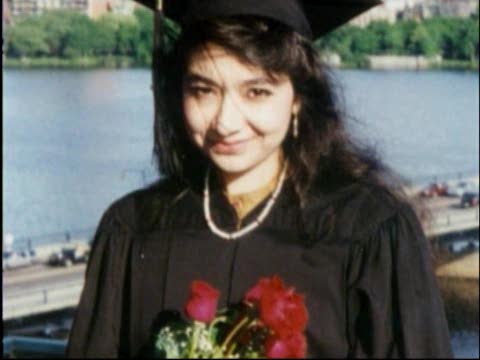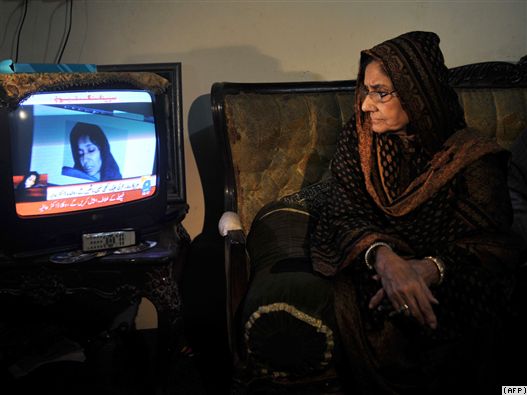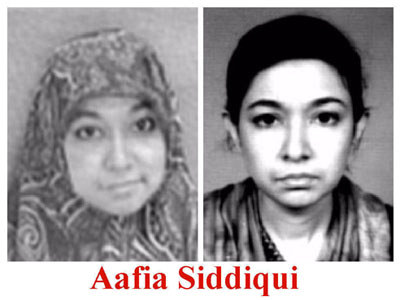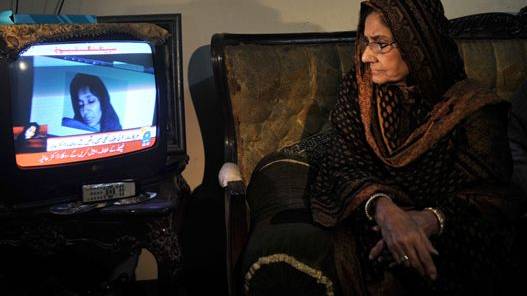Despite U.S. Conviction, Questions Still Swirl Around Case Of Pakistani Scientist
Source: rferl.org

Aafia Siddiqui.
When a 12-member jury in New York City this week convicted Pakistani neuroscientist Aafia Siddiqui of trying to kill her U.S. interrogators in Afghanistan, the reaction back home was swift.
At her family residence in Karachi, scores of supporters from Islamist political parties gathered around her mother, Asmat Siddiqui, who remained defiant in comments to journalists.

In Karachi, Ismat Siddiqui, the mother of Aafia Siddiqui, watches a news report
following the court verdict against her daughter.
"Dr. Aafia is innocent; she is not guilty," she said. "If she had been guilty, I am the kind of mother who would have stood up before anyone else and would have said, 'Punish her. She is guilty.'"
Pakistani leaders from President Asif Ali Zardari to the heads of the country's anti-American Islamist parties have issued statements pledging support for Siddiqui, saying her February 3 conviction is an example of post-9/11 injustice toward Muslims. Some small but vocal groups have organized protest rallies to demand her release from prison. In phone calls to journalists in the region, a self-proclaimed Taliban spokesman threatened to harm at least one American captive the group is holding if Siddiqui is sentenced.
But few are keen on discussing and resolving the many mysteries surrounding her case.
No Clear Answers

Driver's License photo, left, and Facial composite, right, created by the FBI by altering her Drivers License image.
The 37-year-old Siddiqui, who is also a mother of three, was convicted of attempted murder and assault. A New York jury found her guilty of grabbing a U.S. officer's rifle while she was being questioned in 2008 in Afghanistan in connection with containers of chemicals and notes referring to mass-casualty attacks that she was allegedly carrying. She used the rifle to fire at FBI agents and military personnel before she was wrestled to the ground. Siddiqui sustained a gunshot wound in the struggle. No one else was injured.
But there are still no clear answers about her whereabouts in the five years before her detention in Afghanistan. Where was Siddiqui between March 2003 and July 2008? Two of her three children still remain missing. And she has never been tried for her alleged links to Al-Qaeda -- the reason for her original appearance on the FBI's most-wanted list six years ago.
Declan Walsh, an Islamabad-based foreign correspondent for the British daily "The Guardian," tried to resolve these mysteries last year when he traveled across Pakistan to interview officials, Siddiqui's relatives, and anybody who would talk to try to solve the puzzle.
Walsh tells RFE/RL that there are two aspects to Aafia Siddiqui's story. One is the court case in New York, which was strictly focused on the events in a police station in the central Afghan city of Ghazni, where she was interrogated shortly after her arrest in July 2008.
"But the much wider picture really is what was happening with Aafia Siddiqui for the previous five years," he says.
Siddiqui's name first came to light when she disappeared in March 2003 while traveling to the airport in Karachi, according to her family. Walsh says understanding those five years is the key to unlocking her mystery.
"There are these conflicting accounts about where she was for that period," he says. "But the public opinion here in Pakistan is very much with the train of thought that she was in [the U.S. detention center] in Bagram [Afghanistan].
"And I suppose that this really feeds into the kind of broader anti-Americanism in the country where Dr. Aafia Siddiqui's case has become symbolic of wider public anger about the disappearances of terror suspects, about people who go missing and who never come back again, and about perceived injustices in the American judicial system towards Muslims and particularly towards Pakistanis."
Tells A Different Story
This popular account of Siddiqui's fate is supported by her mother and sister and has shaped perceptions in the Pakistani media. But Walsh says that her former husband, Amjad Khan, whom she divorced in 2002, tells a different story.
Khan told Walsh that being concerned for his children, he watched Siddiqui discreetly from a distance and that she was in Pakistan between 2003 and 2008. Walsh adds that her uncle, Shams ul-Hassan Farhuqi, also revealed a bizarre episode when Siddiqui turned up at his house in Islamabad in January 2008 and asked him to send her to the Taliban in Afghanistan because she was "very uncomfortable" about being in the control of an intelligence agency in Pakistan. The uncle claimed Siddiqui told him that the Taliban were "the only people with whom she would feel safe."
Walsh says that the issue has turned into a political case and people on all sides are "looking less at the facts of the case and more at what Aafia Siddiqui represents for them."
He says that while her family and the Pakistani media are focused on Siddiqui's fate, there is little discussion of her two missing children. Her elder son, Ahmed, now 13, was arrested along with her in Afghanistan. He was later returned to his aunt but has never spoken about his mother's intervening disappearance. Her two younger children -- daughter Mariam and son Sulaiman -- are still missing. Siddiqui's family, Walsh says, has remained silent about them.
"There have been accusations and allegations that these children have been taken into orphanages or that they have died in custody," he says. "But there has been no great examination of this side of the case. And that seems very odd to me. And I think this probably suggests why this case has many layers to it, several of which have not yet come to public light."
Independent observers agree.
'Many Questions Not Answered'
I.A. Rehman is the director of the Human Rights Commission of Pakistan (HRCP), an independent group that monitors human rights abuses. He tells RFE/RL that Siddiqui was picked up in Karachi in 2003, as the Pakistani interior minister at the time himself admitted. The Pakistani authorities later changed their stance and claimed they did not have any information about her.
Rehman says that most of what happened to Siddiqui after that is murky and "that many questions have still not been answered properly." Like the cases of hundreds of missing Pakistanis, most of whom are either accused of supporting extremists or separatists, the HRCP investigated Siddiqui's case but found no real clues.
Rehman says that his organization is not against punishing criminals. But he wants open and transparent trials for those accused of terrorism because the moment this label is applied to somebody "all humanitarian considerations are abandoned."
Rehman says his organization is still studying the New York verdict but wants Siddiqui's case to be considered in its entirety, from the time she disappeared in 2003. "Anyone who has committed a crime, whether it is terrorism or a lesser crime, must be made to pay," he says. "But everything should seem fair and above board."
Aafia Siddiqui faces a maximum sentence of life in prison and is expected to be sentenced in early May, but the mystery surrounding her case is unlikely to be resolved by then.
Article from: rferl.org
US frame-up of Aafia Siddiqui begins to unravel
By Ali Ismail | wsws.org
Pakistani neuroscientist Aafia Siddiqui went on trial in a federal courtroom in New York City on January 19, charged with the attempted murder of US personnel in Afghanistan’s Ghazni Province in 2008. The case against Dr. Siddiqui, 37, is rapidly unraveling due to lack of evidence and discordant testimony from witnesses.
It is becoming increasingly evident that the charges amount to a frame-up that has been staged to cover up the fact that Siddiqui, along with her eldest son, had been held without charges in the US military’s notorious Bagram prison in Afghanistan between 2003 and 2008, where they were subjected to torture. Two of Dr. Siddiqui’s younger children are still missing.
According to the account given by US authorities, Aafia Siddiqui was taken into custody by Afghan security services in July of 2008 after they alleged having found a list of US targets for terrorist attacks as well as bomb-making instructions and assorted chemicals.
Despite these claims, Siddiqui is not charged with any terror-related offenses. Instead, she is indicted for allegedly having seized an automatic weapon and fired on her Afghan and American captors when a group of FBI agents and US Army officers arrived to collect her. The most serious charge against her is using a firearm in committing a felony, the gun in question being a US soldier’s rifle.
Siddiqui was shot twice in the stomach and barely survived after medics at Bagram air field had to make an incision from her breastbone to her bellybutton to remove the bullets. It was reported that part of her intestines had to be removed to save her life.
The accusations against Siddiqui strain credulity and have been fervently denied by her relatives, her defense attorneys, and human rights organizations, all of whom claim that she had been held in secret US detention facilities where she was physically and sexually abused ever since she disappeared off the streets of Karachi in the spring of 2003 with her three children, then seven, five, and six months old.
Read the full article at: wsws.org






















